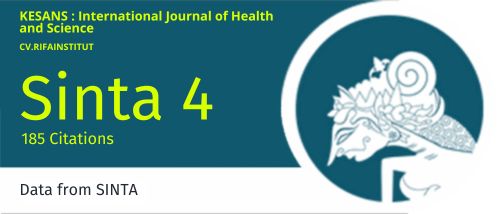Analysis of the Relationship Between Aerosol Optical Depth (AOD) and Particulate Concentration (PM2.5) for Determining the Standard Index of Air Pollution in Jambi Province
DOI:
https://doi.org/10.54543/kesans.v4i10.398Keywords:
Forest and Land fires, PM2.5, Aerosol Optical Depth, Angstrom Exponent, ISPUAbstract
Introduction: Forest and land fires (karhutla) frequently occur in Jambi Province, Indonesia, as indicated by numerous hotspots detected annually. Objective: This study aims to analyze the sources and impacts of karhutla on PM2.5 concentrations, Aerosol Optical Depth (AOD), Angstrom Exponent (AE), and the Air Pollutant Standard Index (ISPU) based on in-situ measurements, as well as to establish an empirical relationship between PM2.5 and AOD for application to Terra-Aqua Satellite AOD (MCD19A2). Method: The data for 2022–2024 were analyzed with the support of the HYSPLIT model and Google Earth Engine. Results and Discussion: Results show a significant increase in hotspots during September–October 2023, indicating extensive fires in Jambi and South Sumatra. PM2.5 concentrations surged to 265.6 µg/m³ in September and 307.4 µg/m³ in October, mainly originating from these regions. Air quality deteriorated, with Unhealthy and Very Unhealthy categories increasing to 31.3–40.1% and 1.7–3.2%, respectively, while Hazardous levels reached 0.3–0.4%. AOD at 440 nm peaked at 2.651 during September 4–October 24, 2023, with AE values between 1.51 and 1.57, confirming fine particles from biomass burning. AOD and PM2.5 showed a positive correlation, expressed by the linear regression equation Y = 36.289x + 13.232 (Y = PM2.5, x = AOD 470 nm). Conclusion: Validation of ISPU from MCD19A2 against ISPU from AQMS measurements resulted in an accuracy of 46.96% without distinguishing the type of pollutant, and 61.67% if the determining parameter is PM2.5.
Downloads
Published
How to Cite
Issue
Section
Citation Check
License
Copyright (c) 2025 Aan Dwilaksono Aji, Aswandi, Hutwan Syarifuddin

This work is licensed under a Creative Commons Attribution-ShareAlike 4.0 International License.





















